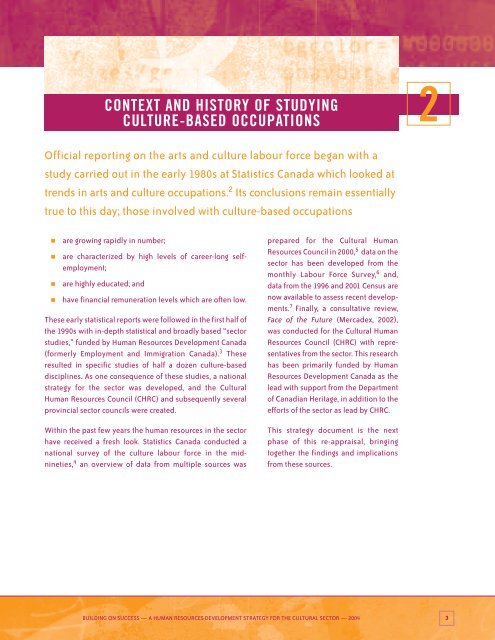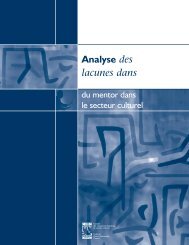Full document
Full document
Full document
Create successful ePaper yourself
Turn your PDF publications into a flip-book with our unique Google optimized e-Paper software.
CONTEXT AND HISTORY OF STUDYING<br />
CULTURE-BASED OCCUPATIONS<br />
2<br />
Official reporting on the arts and culture labour force began with a<br />
study carried out in the early 1980s at Statistics Canada which looked at<br />
trends in arts and culture occupations. 2 Its conclusions remain essentially<br />
true to this day; those involved with culture-based occupations<br />
• are growing rapidly in number;<br />
• are characterized by high levels of career-long selfemployment;<br />
• are highly educated; and<br />
• have financial remuneration levels which are often low.<br />
These early statistical reports were followed in the first half of<br />
the 1990s with in-depth statistical and broadly based “sector<br />
studies,” funded by Human Resources Development Canada<br />
(formerly Employment and Immigration Canada). 3 These<br />
resulted in specific studies of half a dozen culture-based<br />
disciplines. As one consequence of these studies, a national<br />
strategy for the sector was developed, and the Cultural<br />
Human Resources Council (CHRC) and subsequently several<br />
provincial sector councils were created.<br />
Within the past few years the human resources in the sector<br />
have received a fresh look. Statistics Canada conducted a<br />
national survey of the culture labour force in the midnineties,<br />
4 an overview of data from multiple sources was<br />
prepared for the Cultural Human<br />
Resources Council in 2000, 5 data on the<br />
sector has been developed from the<br />
monthly Labour Force Survey, 6 and,<br />
data from the 1996 and 2001 Census are<br />
now available to assess recent developments.<br />
7 Finally, a consultative review,<br />
Face of the Future (Mercadex, 2002),<br />
was conducted for the Cultural Human<br />
Resources Council (CHRC) with representatives<br />
from the sector. This research<br />
has been primarily funded by Human<br />
Resources Development Canada as the<br />
lead with support from the Department<br />
of Canadian Heritage, in addition to the<br />
efforts of the sector as lead by CHRC.<br />
This strategy <strong>document</strong> is the next<br />
phase of this re-appraisal, bringing<br />
together the findings and implications<br />
from these sources.<br />
BUILDING ON SUCCESS — A HUMAN RESOURCES DEVELOPMENT STRATEGY FOR THE CULTURAL SECTOR — 2004 3










